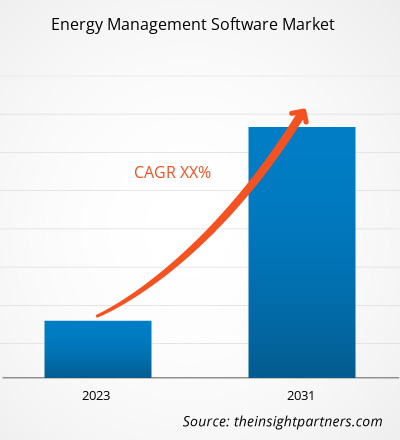MARKET INTRODUCTION
Energy management software refers to a variety of energy-related software applications that offer utility bill tracking, actual-time metering, building simulation and modeling, carbon footprint calculation and reporting, IT equipment management, and energy audits. The new energy management software market is centered on industrial internet of things (IIoT), connected devices, asset performance, energy data quality, sustainability, and energy analytics solutions.
MARKET DYNAMICS
Rising energy consumption and price volatility is driving the growth of the energy management software market. However, the high initial cost of deployment may restrain the growth of the energy management software market. Furthermore, the modernization of aging infrastructure is anticipated to create market opportunity for the energy management software market during the forecast period.
MARKET SCOPE
The "Global Energy Management Software Market Analysis To 2031" is a specialized and in-depth study of the technology, media and telecommunications industry with a special focus on the global market trend analysis. The energy management software market report aims to provide an overview of the energy management software market with detailed market segmentation by software, application, end user, and geography. The global energy management software market is expected to witness high growth during the forecast period. The report provides key statistics on the market status of the leading energy management software market players and offers key trends and opportunities in the market.
MARKET SEGMENTATION
The global energy management software market is segmented on the basis of software, application, end user. Based on software, the energy management software market is segmented into: utility EMS, industrial EMS, residential EMS, enterprise carbon and energy management, and others. On the basis of application, the energy management software market is segmented into: home energy management and building energy management. Based on end user, the energy management software market is segmented into: power and energy, telecom and IT, manufacturing, office and commercial buildings, and others.
REGIONAL FRAMEWORK
The report provides a detailed overview of the industry including both qualitative and quantitative information. It provides an overview and forecast of the global energy management software market based on various segments. It also provides market size and forecast estimates from the year 2021 to 2031 with respect to five major regions, namely; North America, Europe, Asia-Pacific (APAC), Middle East and Africa (MEA) and South & Central America. The energy management software market by each region is later sub-segmented by respective countries and segments. The energy management software market report covers the analysis and forecast of 18 countries globally along with the current trend and opportunities prevailing in the region.
The report analyzes factors affecting the energy management software market from both demand and supply side and further evaluates market dynamics affecting the market during the forecast period i.e., drivers, restraints, opportunities, and future trend. The report also provides exhaustive PEST analysis highlighting factors affecting the energy management software market in these regions.
MARKET PLAYERS
The reports cover key developments in the energy management software market as organic and inorganic growth strategies. Various companies are focusing on organic growth strategies such as product launches, product approvals and others such as patents and events. Inorganic growth strategies activities witnessed in the market were acquisitions, and partnership & collaborations. These activities have paved way for the expansion of business and customer base of market players. The market players from energy management software market are anticipated to lucrative growth opportunities in the future with the rising demand for filter products in the global market. Below mentioned is the list of few companies engaged in the energy management software market.
The report also includes the profiles of key companies along with their SWOT analysis and market strategies in the energy management software market. In addition, the report focuses on leading industry players with information such as company profiles, components, and services offered, financial information of the last 3 years, the key development in the past five years.
- ABB Ltd.
- CA Technologies
- Cisco Systems, Inc.
- Eaton Corporation PLC
- Emerson Electric Company
- General Electric Company
- Honeywell International, Inc.
- IBM Corporation
- Schneider Electric SE
- Wattics Ltd.
Energy Management Software Report Scope
| Report Attribute | Details |
|---|---|
| Market size in 2024 | US$ XX million |
| Market Size by 2031 | US$ XX Million |
| Global CAGR (2025 - 2031) | XX% |
| Historical Data | 2021-2023 |
| Forecast period | 2025-2031 |
| Segments Covered |
By Software
|
| Regions and Countries Covered | North America
|
| Market leaders and key company profiles |
- Historical Analysis (2 Years), Base Year, Forecast (7 Years) with CAGR
- PEST and SWOT Analysis
- Market Size Value / Volume - Global, Regional, Country
- Industry and Competitive Landscape
- Excel Dataset



Report Coverage
Revenue forecast, Company Analysis, Industry landscape, Growth factors, and Trends

Segment Covered
This text is related
to segments covered.

Regional Scope
North America, Europe, Asia Pacific, Middle East & Africa, South & Central America

Country Scope
This text is related
to country scope.
Trends and growth analysis reports related to Technology, Media and Telecommunications : READ MORE..
The List of Companies
1. ABB Ltd.
2. CA Technologies
3. Cisco Systems, Inc.
4. Eaton Corporation PLC
5. Emerson Electric Company
6. General Electric Company
7. Honeywell International, Inc.
8. IBM Corporation
9. Schneider Electric SE
10. Wattics Ltd.
1. ABB Ltd.
2. CA Technologies
3. Cisco Systems, Inc.
4. Eaton Corporation PLC
5. Emerson Electric Company
6. General Electric Company
7. Honeywell International, Inc.
8. IBM Corporation
9. Schneider Electric SE
10. Wattics Ltd.

 Get Free Sample For
Get Free Sample For